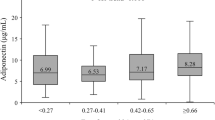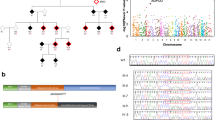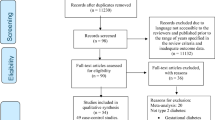Abstract
Adiponectin is an insulin sensitiser in muscle and liver, and low serum levels characterise obesity and insulin resistance. Eight tagging single nucleotide polymorphisms (tSNPs) in the ADIPOQ gene and promoter were selected, and association with serum adiponectin was tested, in two independent samples of Caucasian women: the Chingford Study (n = 808, mean age 62.8 ± 5.9 years) and Twins UK (n = 2,718, mean age 47.4 ± 12.6 years). In the Chingford cohort, −11391 G/A, −10066 G/A (rs182052), −7734 C/A (rs16861209), +276 G/T (rs1501299) and +3228 C/T (rs1063537) were significantly associated with fasting serum adiponectin (Ps = 1.00 × 10−4 to 1.40 × 10−2). Associations with all except +3228 C/T were replicated in the Twins UK cohort (Ps = 3.19 × 10−9 to 6.00 × 10−3). In Chingford subjects, the 12 most common 8-SNP haplotypes (frequency 1.90%) explained 2.85% (p = 5.00 × 10−2) and in Twins UK subjects, the four most common 5-SNP haplotypes (frequency > 5.00%) explained 1.66% of the variance (p = 5.83 × 10−7). To investigate effects of −11391 G/A (rs17300539) and −11377 C/G (rs266729) on promoter activity, 1.2 kb of the ADIPOQ promoter region was cloned in a luciferase reporter plasmid, and the four haplotypes were transfected in differentiated 3T3-L1 adipocytes. No significant allelic effects on promoter activity were found.
Similar content being viewed by others
Log in or create a free account to read this content
Gain free access to this article, as well as selected content from this journal and more on nature.com
or
Abbreviations
- ADIPOQ :
-
adiponectin gene
- BMI:
-
body mass index
- CEU:
-
Centre d’Etude du Polymorphisme Humain Utah
- DELFIA:
-
dissociation-enhanced lanthanide fluorescence immunoassay
- DEXA:
-
dual-emission X-ray absorption
- DMEM:
-
Dulbecco’s modified Eagle’s medium
- DZ:
-
dizygous
- ELISA:
-
enzyme-linked immunosorbent assay
- GEE:
-
generalised estimating equations
- HGVbase:
-
human genome variation database
- LD:
-
linkage disequilibrium
- MAF:
-
minor allele frequency
- MZ:
-
monozygous
- NCBI:
-
National Center for Biotechnology Information
- QTL:
-
quantitative trait locus
- SNP:
-
single nucleotide polymorphism
- TDT:
-
transmission disequilibrium test
- tSNP:
-
tagging SNP
References
Abecasis GR, Cookson WO (2000) GOLD—graphical overview of linkage disequilibrium. Bioinformatics 16:182–183
Ahima RS, Flier JS (2000) Adipose tissue as an endocrine organ. Trends Endocrinol Metab 11:327–332
Andrew T, Hart D, Snieder H, de Lange M, Spector TD, MacGregor AJ (2001) Are twins and singletons comparable? A study of disease-related and lifestyle characteristics in adult women. Twin Res 4:464–477
Arita Y, Kihara S, Ouchi N, Takahashi M, Maeda K, Miyagawa J, Hotta K, Shimomura I, Nakamura T, Miyaoka K, Kuriyama H, Nishida M, Yamashita S, Okubo K, Matsubara K, Muraguchi M, Ohmoto Y, Funahashi T, Matsuzawa Y (1999) Paradoxical decrease of an adipose-specific protein, adiponectin, in obesity. Biochem Biophys Res Commun 257:79–83. doi:10.1006/bbrc.1999.0255
Bader JS (2001) The relative power of SNPs and haplotype as genetic markers for association tests. Pharmacogenomics 2:11–24. doi:10.1517/14622416.2.1.11
Bouatia-Naji N, Meyre D, Lobbens S, Séron K, Fumeron F, Balkau B, Heude B, Jouret B, Scherer PE, Dina C, Weill J, Froguel P (2006) ACDC/adiponectin polymorphisms are associated with severe childhood and adult obesity. Diabetes 55:545–550
Cesari M, Narkiewicz K, De Toni R, Aldighieri E, Williams CJ, Rossi GP (2007) Heritability of plasma adiponectin levels and body mass index in twins. J Clin Endocrinol Metab 92:3082–3088. doi:10.1210/jc.2007-0403
Chapman JM, Cooper JD, Todd JA, Clayton DG (2003) Detecting disease associations due to linkage disequilibrium using haplotype tags: a class of tests and the determinants of statistical power. Hum Hered 56:18–31. doi:10.1159/000073729
Comuzzie AG, Funahashi T, Sonnenberg G, Martin LJ, Jacob HJ, Black AE, Maas D, Takahashi M, Kihara S, Tanaka S, Matsuzawa Y, Blangero J, Cohen D, Kissebah A (2001) The genetic basis of plasma variation in adiponectin, a global endophenotype for obesity and the metabolic syndrome. J Clin Endocrinol Metab 86:4321–4325
Duncan BB, Schmidt MI, Pankow JS, Bang H, Couper D, Ballantyne CM, Hoogeveen RC, Heiss G (2004) Adiponectin and the development of type 2 diabetes: the atherosclerosis risk in communities study. Diabetes 53:2473–2478
Filippi E, Sentinelli F, Trischitta V, Romeo S, Arca M, Leonetti F et al (2004) Association of the human adiponectin gene and insulin resistance. Eur J Hum Genet 12:199–205. doi:10.1007/s00109-005-0667-z
Francke S, Manraj M, Lacquemant C, Lecoeur C, Leprêtre F, Passa P, Hebe A, Corset L, Yan SL, Lahmidi S, Jankee S, Gunness TK, Ramjuttun US, Balgobin V, Dina C, Froguel P (2001) A genome-wide scan for coronary heart disease suggests in Indo-Mauritians a susceptibility locus on chromosome 16p13 and replicates linkage with the metabolic syndrome on 3q27. Hum Mol Genet 10:2751–2765
Hara K, Boutin P, Mori Y, Tobe K, Dina C, Yasuda K, Yamauchi T, Otabe S, Okada T, Eto K, Kadowaki H, Hagura R, Akanuma Y, Yazaki Y, Nagai R, Taniyama M, Matsubara K, Yoda M, Nakano Y, Tomita M, Kimura S, Ito C, Froguel P, Kadowaki T (2002) Genetic variation in the gene encoding adiponectin is associated with an increased risk of type 2 diabetes in the Japanese population. Diabetes 51:536–540
Hart DJ, Spector TD (1993) The relationship of obesity, fat distribution and osteoarthritis in women in the general population: the Chingford Study. J Rheumatol 20:331–335
Heid IM, Wagner SA, Gohlke H, Iglseder B, Mueller JC, Cip P, Ladurner G, Reiter R, Stadlmayr A, Mackevics V, Illig T, Kronenberg F, Paulweber B (2006) Genetic architecture of the APM1 gene and its influence on adiponectin plasma levels and parameters of the metabolic syndrome in 1,727 healthy Caucasians. Diabetes 55:375–384
Hoefle G, Muendlein A, Saely CH, Risch L, Rein P, Koch L, Schmid F, Aczel S, Marte T, Langer P, Drexel H (2007) The -11377 C/G promoter variant of the adiponectin gene, prevalence of coronary atherosclerosis, and incidence of vascular events in men. Thromb Haemost 97:451–457. doi:10.1160/TH06-11-0646
Iwashima Y, Katsuya T, Ishikawa K, Ouchi N, Ohishi M, Sugimoto K, Fu Y, Motone M, Yamamoto K, Matsuo A, Ohashi K, Kihara S, Funahashi T, Rakugi H, Matsuzawa Y, Ogihara T (2004) Hypoadiponectinemia is an independent risk factor for hypertension. Hypertension 43:1318–1323. doi:10.1161/01.HYP.0000129281.03801.4b
Jamshidi Y, Snieder H, Wang X, Pavitt MJ, Spector TD, Carter ND, O’Dell SD (2006) Phosphatidylinositol 3-kinase p85 alpha regulatory subunit gene PIK3R1 haplotype is associated with body fat and serum leptin in a female twin population. Diabetologia 49:2659–2667. doi:10.1007/s00125-006-0388-z
Kazumi T, Kawaguchi A, Hirano T, Yoshino G (2004) Serum adiponectin is associated with high-density lipoprotein cholesterol, triglycerides, and low-density lipoprotein particle size in young healthy men. Metabolism 53:589–593. doi:10.1016/j.metabol.2003.12.008
Kita A, Yamasaki H, Kuwahara H, Moriuchi A, Fukushima K, Kobayashi M, Fukushima T, Takahashi R, Abiru N, Uotani S, Kawasaki E, Eguchi K (2005) Identification of the promoter region required for human adiponectin gene transcription: Association with CCAAT/enhancer binding protein-beta and tumor necrosis factor-alpha. Biochem Biophys Res Commun 331:484–490. doi:10.1016/j.bbrc.2005.03.205
Kumada M, Kihara S, Sumitsuji S, Kawamoto T, Matsumoto S, Ouchi N, Arita Y, Okamoto Y, Shimomura I, Hiraoka H, Nakamura T, Funahashi T, Matsuzawa Y; Osaka CAD Study Group Coronary artery disease (2003) Association of hypoadiponectinemia with coronary artery disease in men. Arterioscler Thromb Vasc Biol 23:85–89. doi:10.1161/01.ATV.0000048856.22331.50
Menzaghi C, Ercolino T, Di Paola R, Berg AH, Warram JH, Scherer PE, Trischitta V, Doria A (2002) A haplotype at the adiponectin locus is associated with obesity and other features of the insulin resistance syndrome. Diabetes 51:2306–2312
Menzaghi C, Ercolino T, Salvemini L, Coco A, Kim SH, Fini G, Doria A, Trischitta V (2004) Multigenic control of serum adiponectin levels: evidence for a role of the ADIPOQ gene and a locus on 14q13. Physiol Genomics 19:170–174. doi:10.1152/physiolgenomics.00122.2004
Menzaghi C, Trischitta V, Doria A (2007) Genetic influences of adiponectin on insulin resistance, type 2 diabetes, and cardiovascular disease. Diabetes 56:1198–1209
Ohashi K, Ouchi N, Kihara S, Funahashi T, Nakamura T, Sumitsuji S et al (2004) Adiponectin I164 T mutation is associated with the metabolic syndrome and coronary artery disease. J Am Coll Cardiol 43:1195–1200. doi:10.1016/j.jacc.2003.10.049
Petrone A, Zavarella S, Caiazzo A, Leto G, Spoletini M, Potenziani S, Osborn J, Vania A, Buzzetti R (2006) The promoter region of the adiponectin gene is a determinant in modulating insulin sensitivity in childhood obesity. Obesity (Silver Spring) 14:1498–1504
Pollin TI, Tanner K, O’Connell JR, Ott SH, Damcott CM, Shuldiner AR, McLenithan JC, Mitchell BD (2005) Linkage of plasma adiponectin levels to 3q27 explained by association with variation in the ADIPOQ gene. Diabetes 54:268–274
Qi L, Li T, Rimm E, Zhang C, Rifai N, Hunter D, Doria A, Hu FB (2005) The +276 polymorphism of the ADIPOQ gene, plasma adiponectin concentration, and cardiovascular risk in diabetic men. Diabetes 54:1607–1610
Schaffler A, Langmann T, Palitzsch KD, Scholmerich J, Schmitz G (1998) Identification and characterization of the human adipocyte apM-1 promoter. Biochim Biophys Acta 1399:187–197
Schwarz PE, Towers GW, Fischer S, Govindarajalu S, Schulze J, Bornstein SR, Hanefeld M, Vasseur F (2006) Hypoadiponectinemia is associated with progression toward type 2 diabetes and genetic variation in the ADIPOQ gene promoter. Diabetes Care 29:1645–1650. doi:10.2337/dc05-2123
Spector TD, Williams FM (2006) The UK Adult Twin Registry (Twins UK). Twin Res Hum Genet 9:899–906
Spencer-Jones NJ, Wang X, Snieder H, Miller CS, Spector TD, Carter ND, O’Dell SD (2005) Protein tyrosine phosphatase-1B gene PTPN1: Selection of tagging SNPs and association with body fat, insulin sensitivity and the metabolic syndrome in a normal female population. Diabetes 54:3296–3304
Stephens M, Smith NJ, Donnelly P (2001) A new statistical method for haplotype reconstruction from population data. Am J Hum Genet 68:978–989
Stram DO, Haiman CA, Hirschhorn JN, Altshuler D, Kolonel LN, Henderson BE, Pike MC (2003) Choosing haplotype-tagging SNPs based on unphased genotype data using a preliminary sample of unrelated subjects with an example from the Multiethnic Cohort Study. Hum Hered 55:27–36. doi:10.1159/000071807
Trégouët D-A, Ducimetère P, Tiret L (1997) Testing association between candidate-gene markers and phenotype in related individuals, by use of estimating equations. Am J Hum Genet 61:189–199
Valle M, Martos R, Gascon F, Canete R, Zafra MA, Morales R (2005) Low-grade systemic inflammation, hypoadiponectinemia and a high concentration of leptin are present in very young obese children, and correlate with metabolic syndrome. Diabetes Metab 31:55–62. doi:10.1019/200512008
Vasseur F, Helbecque N, Dina C, Lobbens S, Delannoy V, Gaget S, Boutin P, Vaxillaire M, Leprêtre F, Dupont S, Hara K, Clément K, Bihain B, Kadowaki T, Froguel P (2002) Single-nucleotide polymorphism haplotypes in the both proximal promoter and exon 3 of the ADIPOQ gene modulate adipocyte-secreted adiponectin hormone levels and contribute to the genetic risk for type 2 diabetes in French Caucasians. Hum Mol Genet 11:2607–2614
Vasseur F, Helbecque N, Lobbens S, Vasseur-Delannoy V, Dina C, Clément K, Boutin P, Kadowaki T, Scherer PE, Froguel P (2005) Hypoadiponectinaemia and high risk of type 2 diabetes are associated with adiponectin-encoding (ACDC) gene promoter variants in morbid obesity: evidence for a role of ACDC in diabesity. Diabetologia 48:892–899. doi:10.1007/s00125-005-1729-2
Vionnet N, Hani EH, Dupont S, Gallina S, Francke S, Dotte S, De Matos F, Durand E, Leprêtre F, Lecoeur C, Gallina P, Zekiri L, Dina C, Froguel P (2000) Genomewide search for type 2 diabetes susceptibility genes in French whites: evidence for a novel susceptibility locus for early-onset diabetes on chromosome 3q27-qter and independent replication of a type 2 diabetes locus on chromosome 1q21q24. Am J Hum Genet 67:1470–1480
Vozarova de Courten B, Hanson RL, Funahashi T, Lindsay RS, Matsuzawa Y, Tanaka S, Thameem F, Gruber JD, Froguel P, Wolford JK (2005) Common polymorphisms in the adiponectin gene ACDC are not associated with diabetes in Pima Indians. Diabetes 54:284–289
Woo JG, Dolan LM, Deka R, Kaushal RD, Shen Y, Pal P, Daniels SR, Martin LJ (2006) Interactions between noncontiguous haplotypes in the adiponectin gene ACDC are associated with plasma adiponectin. Diabetes 55:523–529
Yamauchi T, Kamon J, Waki H, Terauchi Y, Kubota N, Hara K, Mori Y, Ide T, Murakami K, Tsuboyama-Kasaoka N, Ezaki O, Akanuma Y, Gavrilova O, Vinson C, Reitman ML, Kagechika H, Shudo K, Yoda M, Nakano Y, Tobe K, Nagai R, Kimura S, Tomita M, Froguel P, Kadowaki T (2001) The fat-derived hormone adiponectin reverses insulin resistance associated with both lipoatrophy and obesity. Nat Med 7:941–946. doi:10.1038/90984
Acknowledgments
This work was funded by the British Heart Foundation Project grant No. PG/04/028 and Wellcome Trust project grant number 073142. The Twin Research and Genetic Epidemiology Unit received support from the Wellcome Trust, Arthritis Research Campaign, the Chronic Disease Research Foundation and the European Union 5th Framework Programme Genom EU twin no. QLG2-CT-2002-01254 and EuroClot project LSHM-CT-2004-005268.
Author information
Authors and Affiliations
Corresponding author
Electronic supplementary material
Below is the link to the electronic supplementary material.
Rights and permissions
About this article
Cite this article
Kyriakou, T., Collins, L.J., Spencer-Jones, N.J. et al. Adiponectin gene ADIPOQ SNP associations with serum adiponectin in two female populations and effects of SNPs on promoter activity. J Hum Genet 53, 718–727 (2008). https://doi.org/10.1007/s10038-008-0303-1
Received:
Accepted:
Published:
Issue date:
DOI: https://doi.org/10.1007/s10038-008-0303-1
Keywords
This article is cited by
-
LEP (G2548A-G19A) and ADIPOQ (T45G-G276T) gene polymorphisms are associated with markers for metabolic syndrome
Diabetology & Metabolic Syndrome (2023)
-
The Association of SNP276G>T at Adiponectin Gene with Insulin Resistance and Circulating Adiponectin in Morbid Obese Patients After a Biliopancreatic Diversion Surgery
Obesity Surgery (2017)
-
Single nucleotide polymorphism rs3774261 in the AdipoQ gene is associated with the risk of coronary heart disease (CHD) in Northeast Han Chinese population: a case-control study
Lipids in Health and Disease (2016)
-
Revealing the Strong Functional Association of adipor2 and cdh13 with adipoq: A Gene Network Study
Cell Biochemistry and Biophysics (2015)
-
Associations between variants on ADIPOQ and ADIPOR1 with colorectal cancer risk: a chinese case-control study and updated meta-analysis
BMC Medical Genetics (2014)



